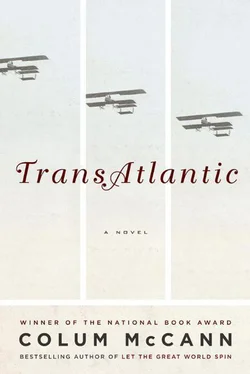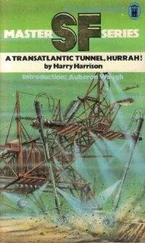— So tell me, he says, where do we stand?
What they have is a sixty-page draft, two governments, ten political parties, little less than two weeks. Strand One. Strand Two. Strand Three. None of the strands yet set in stone. The incredible weave of language. All the little tassels still hanging down. The tiniest atoms. The poorly tied knots. There is the possibility of an annex. The rumor of a rewrite. The suggestion of a delay. Where are they in London? Where are they are in Dublin? Where are they in the Maze? Or is that Long Kesh? There has been a call for transcripts of the plenaries. What exactly does substantive negotiations mean? Did the security team check the political background of the canteen staff? There is talk of a farm on the Tyrone border where whole crates of rocket-propelled grenades have been hidden. Someone has leaked the MI-5 report to the London Times . Could anyone please decommission the Sunday World ? Paisley is cooking up a protest outside the gates. Did you hear that Mo Mowlam took off her wig again? Can you believe that they tried to smuggle a tape recorder into the Stormont inside a sofa? There are whispers of assassination attempts from within the prison walls. A 440-pound bomb was defused in Armagh. Someone threw a Molotov cocktail into the grounds of a Catholic kindergarten. The Women’s Coalition has called for calm and decency. The light in David Trimble’s office was on until four thirty in the morning. Someone should make sure that the Sands graffiti in Ballycloghan is scrubbed off. The one thing that should be working flawlessly are the photocopy machines. Make sure the word draft is stamped clearly across every page. Was there absolute clarification yet on the North-South ministerial council?
Everyone jumping off their own ledges, sailing out into the middle of the air, developing patterns of flight on the way down.
LATER IN THE morning, alone in his back office, he turns the desk lamp on. A small tilted urn of light. His desk has been cleaned. His photos dusted. The pile of papers stacked high. The red light on his private message machine blinks. He skips through the messages: seven in all. The second to last from Heather. She must have called in the middle of the night. Listen , she says. The sound of his son sleeping. Listen . The small intake of Andrew’s breath. He plays it twice and then a third time.
Sixty-one children.
He flicks the buttons open on his sleeves, rolls the cuffs back, phones downstairs to see if they’d bring him another pot of tea.
ONE SUMMER IN Acadia he learned chess. Move after move. Swap. Remain. Stay. The incredible switch of the king and the castle amazed him. You had to touch the king first and then bring the castle across. He was fascinated by the edge of the board. There was a saying: The knight on the rim is grim .
He learned to keep the knight over at the edge, safe until, late in the game, he could come inside and there was a whole board with eight sudden squares.
FOR THREE DAYS he and his staff stay in the Europa. In downtown Belfast. The Hardboard Hotel, they call it. The Piece Palace. Bits of it blown up twenty-seven times over the past few years. The most-bombed hotel in Europe. It is still, for some reason, the hotel of choice for the journalists, most of whom he knows on a first-name basis. They hang out in the piano bar, all times of the day. He has seen them often, the first drink placed down in front of them, practicing their posture, their casual disregard, their unreadability. They sit at the back as if the act of drinking has been forced upon them. Its obligation. And then all of a sudden the first drink is gone, and they are half a dozen towards obliteration. Stories of Sarajevo, no doubt. Srebrenica. Kosovo. As if Northern Ireland is a slight melancholy demotion. The very idea of a peace process is sentimental to many of them. A mysterious part of them needs an epic failure. They are out most nights, looking for the burning barrels and the kneecapped girls. Or else they are looking for a leak, some shred of scandal, some sexual sectarianism. When he enters the lobby, they try to cadge a quote. He understands it, the base desire at the core of a story. To put their own version of events into the world. It is the tabloids that he avoids the most: the Sun , the Mirror , the News of the World . He is careful whom he is seen stepping into the elevator with, just in case they take a candid shot of him.
They see him as a man who had stepped out from another century, polite, reserved, judicial, an ancient American, yet it is also a form of disguise: underneath they intuit that he is cast for the very end of the twentieth century, biding his time, waiting for his moment. No one has ever quite fully figured him out, if he is driven by the fear of evil, or spurred on by the prospect of what is good, or if he lies in the complicated in-between. Mystery. Silence. Sleep.
Upstairs, the suite is small and dark. The bed narrow. The bedcovers shiny with use. But there is at least a bowl of fruit on the table and flowers on the credenza. Easter lilies: a gentle nudge.
Bags on the floor. Jacket. Shirt. Belt. Trousers. No Heather to tidy him up. He lies down, exhausted, the day’s work still trilling in him. He feels bad for the two security men who have to guard his door. He would like to invite them in, have them put their feet up, pour a soda from the minibar. They are good men, one and all, but what a job, to stand outside a door all night with only the silence of a man who has learned to sleep anywhere, anytime.
Hotel rooms sharpen his loneliness. The hum of others who were here before.
One of his aides once dropped a contact lens on the floor near the window in the downstairs dining room. She got to her knees and searched around by the baseboards. Bits of dust, stray edges of the carpet. She found the contact lens clinging to a piece of wallpaper. But when she fingered the lens, she noticed, for the first time, that the slice of wallpaper was newer than the surroundings. A perfect square, but the paper had been badly applied. A bit of the wallpaper had begun to peel. She noticed a scorch mark beneath, the blackness faded to red. Most likely a petrol bomb thrown years ago. The old hieroglyphics of violence.
He has heard that the women of Belfast used to keep wet blankets by the door, just in case.
He pulls back his own blanket, prepares himself for bed. He has a mobile wardrobe that accompanies him from place to place, a set of lurking ghost clothes. He finds the pajamas, gruffs his way into them. It’s easy then to fall asleep, if even just for a few hours.
HUME. TRIMBLE. ADAMS. Mowlam. Mallon. McMichael. Cooney. Hill. Donoghue. McWilliams. Sager. One by one they visit his office. The air of worried men and women. Everyone with something to lose. This — he has discovered — is part of their generosity. The ability to embrace failure. The cost of what they might leave behind.
They are at ease with him now. They know his ways. He does not like to sit behind his desk anymore. He has broken that territory. He comes out, instead, and sits by the small table that he has set up near the window with four wooden chairs.
With each visitor there is a new set of biscuits and a warm teapot. He pours the tea himself. One of his small gestures. He is not sure if it’s a trick or not, but he likes the ritual. The trays are stacked upon his desk. That, too, is part of his routine. He does not want the meetings disturbed. Showmanship or decency: he is not sure which.
He brings the trays downstairs to the canteen where the ladies in the hairnets hurry out to meet him, all fuss and apology.
— What about ye, Senator?
— Leave those trays be, Senator.
— Ach, don’t be doing that. What’re ye like?
Читать дальше












